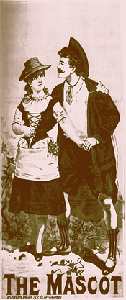
Some of the re-releases in the Accord Operette series are
rare recordings and this is one of them.
Edmond
Audran is not well known outside France where he was regarded
as a lightweight composer. Born in Lyons he is little heard of
now yet at one time he was remembered for a number of operettas
produced in Paris. Olivette (1879), The Grand Mogal
(1882) and Miss Helyett (1890) are little known
today though a few recordings exist (c.1969) on the Gaïeté
Lyrique label (MU744). His scores contain pleasant, unsophisticated
melodies.
His
most successful operettas came in 1880 with La Mascotte
and in 1896 with the more sophisticated La Poupée. Audran
rose to a higher musical level in composing a grand opera, Photis
(1896), but this was never published and is totally unknown.
The
present rare recording of La Mascotte is interesting
because it allows one to study this composer's style which rings
the changes on Offenbach and other contemporaries. To me, the
overture is a bit of an enigma and one should not use it as a
basis for judging the vocal material that follows. The material
is thinly scored and is not particularly engaging. Perhaps the
problem is the way it is played? As so often happens, composers
of this period seemed happy to leave overture writing to someone
else, usually a theatre's musical director. It is surprising that
Audran ever allowed it to stand without modification and enrichment
of orchestral detail.
By
1885 La Mascotte had chalked up 1000 performances,
so what are its attractive features and what is its plot? The
Parisians enjoyed its comic overtones and the piece flows well
with some attractive tunes. Audran's music is bright and carries
the plot along nicely. The operetta is a story of situations of
luck and bad luck bestowed on its characters:
A
farmer, Rocco, is blessed by bad luck and so his superstitious
brother sends to him Bettina, a country girl, as a mascot who
he hopes will cure this ill fortune. The farmer's shepherd, Pippo,
falls for the virgin Bettina, who is later encouraged by Prince
Laurent to live at his nearby castle. (The Prince is the operetta's
comic character who despite his station shouldn't be taken too
seriously.) Pippo helps Bettina escape from the castle when it
seems she is about to be married to the Prince. The lonely Prince
now receives a bout of bad luck when war breaks out and he is
rejected by his subjects. Pippo marries Bettina in the hope that
her powers (imaginary?) will be hereditarily bestowed on their
children.
The
performance is strong and the singing of Moizan and Massard does
not disappoint. Baroux is anything but a lyric singer but this
is not a necessity for his part. (There is no point in detailing
all singers where no rival recording exists.) I found the abridged
dialogue convincing and the studio orchestra plays well, though
at times ponderously under Benedetti's direction. It is unusual
that the principal male parts are written for tenor rather than
a mixture of voices.
The
recording is clear, with singers usually closely miked. They don't
drown the orchestra, however. The acoustic is fairly dry but the
brass, notably the horns in fanfares, are given a wider acoustic
to shows off to good advantage.
Brief
notes in French are provided in the attractive card case.
Raymond
Walker

Other
sets in the Accord 'Operette' series:
Benatzky,
L'Auberge du Cheval Blanc [465 880-2];
Christiné,
Dédé [461 961-2] Phi-Phi [465 886-2];
Dumas,
Ignace [472 877-2];
Ganne,
Les Saltimbanques [465 868-2];
Goublier,
La Cocarde de Mimi Pinson [461 964-2];
Lecocq,
La Fille de Madame Angot [465 883-2] Le Petit Duc [472
874-2];
Lehár,
Paganini [472 868-2] Rose de Noel [472 871-2];
Maillart,
Les Dragons de Villars [472 865-2];
Messager,
Véronique [465 864-2];
Offenbach,
La Belle Hélène[461 954-2] La Fille du
Tambour Major [461 673-2] La Grande Duchesse de Gérolstein
[465 871-2];
Planquette,
Les Cloches de Corneville [465 861-2];
Strauss,
Trois Valses [461 958-2];
Varney,
Les Mousquetaires au Couvent [465 874-2];
Yvain,
La-Haut [461 967-2].
Further
reading: "Operetta", Traubner
(Oxford 2003); ‘Musicals", Ganzl
(Carlton 1995)
Operette
series from Universal Accord reviewed
by Ray Walker


